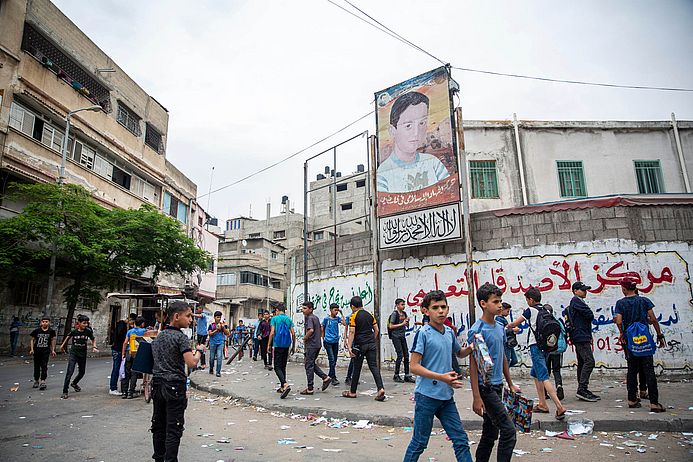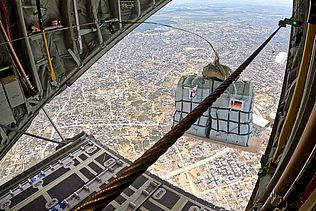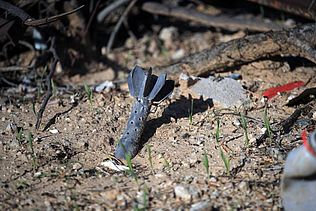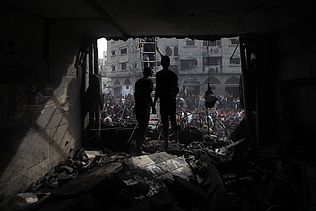If you work in the Palestinian context, you tend to turn into an encyclopaedia of figures. One that should not be missing from any description of the situation in my view is 19.5. That is the average age of Palestinians in the occupied Palestinian territories. Germans are 25 years older on average, at 44 and a half. This also means that far more than half the Palestinian population was born after the year 2000 and as such has no personal memories of the second Intifada. The Palestinian population is the second youngest in the world. You notice this when, in a city like Ramallah, children in school uniforms dominate the cityscape at certain times of the day, or when the towns and villages fill up with tens of thousands of young people following the Tawjihi final exams, the Palestinian equivalent of A-levels.
Neoliberal individualisation
What do these trends mean for the Palestinian question of land restitution, the question of return? For the debates on resistance, justice and the formation of an independent state - especially when the pressure of the Israeli occupation and settlement policy is growing? In the past, in addition to parties and movements, Palestinian institutions have played a key role in keeping this agenda present and alive. But since the second Intifada failed in this regard almost 20 years ago, young Palestinians have turned their backs on most of the established structures.
There are many reasons for this. First, the horrific consequences of the occupation and the military violence the Palestinians face are a daily reality for every individual and every family. In light of this, the Palestinian Authority (PA)’s cooperation with the Israeli authorities feels like a betrayal to many. Second, the PA’s disastrous neoliberal policies have weakened Palestinian society. It has created a depoliticised and economically dependent middle and upper class invested in the status quo. At the same time, deregulation of the banking sector has created a debt economy: in a society that hardly knew debt and credit, it suddenly became easy and normal to borrow. This has led to an expansion of material consumerism, but also to widespread debt. Above all, though, it has promoted individualisation in a society previously defined by a focus on community and a collective spirit of resistance, leaving a nasty taste in many young people’s mouths today.
There is a similar sense of alienation towards traditional volunteer groups and people’s committees. The latter are local community organisations that engage in both educational and political work for young people. For a long time, they were the backbone of a politically active community. In recent decades, though, these structures have increasingly petered out. Here, too, the PA’s neoliberalism is taking its toll. Add to this the fact that Palestinian and international NGO work in Palestine has also successively dwindled over the last 15 years in the wake of exhaustion and changing priorities on the part of donors. It is also partly the result of longstanding Israeli efforts to criminalise certain NGOs.
The ramification of these dynamics is that an entire generation of Palestinian young people has been politically and socially demobilised. Spaces of freedom, but also the hope for liberation, are being whittled away ever further. In the course of this change, the ideas about how to oppose the Israeli policy of land theft and colonisation have altered, and also who opposes it at all. The Palestinian Authority has lost all legitimacy in many people’s eyes, and Palestinian institutions are no longer seen as places of resistance and hope. This is most evident in the formation of new armed groups and the broad sympathy they enjoy. They are hugely popular, especially amongst the younger generation, and a fair few young men join groups like “Lion’s Den”, “Jenin Battalions” or “Tulkarem Brigades”. Despite a lack of training and shoddy military equipment, and the fact that they are mostly under the patronage of Hamas or the Palestinian Islamic Jihad, young people are drawn to them - not least because of the daily attacks which often leave friends, relatives and neighbours dead. In any case, these groups symbolise a resolute disassociation and rejection of the institutions of their own Palestinian Authority. Almost seven out of ten Palestinians support the creation of more militant groups over which the PA is said to have no control. Despite their blatant inferiority vis-à-vis Israel and their expected military failure, these groups should therefore not be dismissed as something fleeting.
Overcoming fragmentation
Despite all the gridlock, though, it should not be ignored that new spaces have also opened up. Social media is often discussed first and foremost in terms of its new significance for resistance groups. But it goes far beyond that. The new possibilities for exchange and communication help overcome the isolation of Palestinians, including those with Israeli passports, in the fragmented realities of the West Bank, Jerusalem or the Gaza Strip. This was most evident in May 2021, when a general strike was called on social media in response to Israeli military attacks on Gaza and attempts to forcibly evict Palestinian families in Sheikh Jarrah, a district in occupied East Jerusalem. This was indeed actioned in the different territories.
The Palestinian left especially has long since argued that a solution that does not include all Palestinians, including those in the diaspora, is doomed to failure. For a long time, the PLO and the Palestinian Authority had a monopoly on political strategies. In the wake of their failure, the armed groups, each with their own interests, have come into the spotlight. All the more reason for activists and intellectual circles to present alternatives to a frustrated and exhausted population. But where can such an alternative start?
Life in the Palestinian communities has changed noticeably in recent years, which is also down to the confidence of a new, young generation. In some ways, it has become more Palestinian. For instance, the food on offer is different: ten years ago, it was difficult to find a Palestinian restaurant in Ramallah, Bethlehem or Jerusalem that was not geared towards tourists. In various towns and cities, weekly markets offering mainly Palestinian products are happening more and more frequently - in an age of debt for the dream of a bourgeois, neoliberal life, such initiatives promoting a Palestinian economy (and courses on how to produce goods offered on a regular basis) are a small but important contribution to creating an alternative. At any rate, the search for traces of a new Palestinian movement cannot miss out the everyday culture of a young Palestinian generation, which despite all the horrors faced is also an expression of an unrelenting desire for life and freedom.




